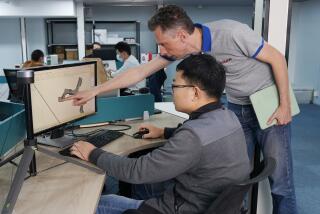Industry Likely to Be a Positive Force in China
- Share via
“We are producing as usual, and there are the usual traffic jams on the roads into China,” said Patrick Wang in a telephone chat Tuesday from his office in Hong Kong.
Wang, 39, is managing director of Johnson Electric Industrial Manufactory Ltd., a firm that makes tiny motors for automobile parts and household appliances--and has most of its assembly work done over the border from Hong Kong, in Shenzhen, China.
But Wang is not panicking. He does not believe that the current strife will cause China, the land of his birth, to close down business operations or its contacts with the outside world. Nor does Wang see a bleak future for Hong Kong, which is holding a general strike today to protest the Chinese military killings of Chinese students. “Whoever is going to take over in China, has got to manage an economy,” says Wang, “There is a mutual dependency between Hong Kong and China.”
Wang is expressing a businessman’s positive logic: That China’s need for jobs and economic development will protect its relationships with Hong Kong, the mountainous territory and island on China’s southern coast that has been a British colony for almost 150 years.
Short term, that China-Hong Kong relationship is a bit like the border industry relationship of Mexico and the United States. More than 1 million factory hands in China’s Guangdong province work for Hong Kong manufacturers. Their wages of 50 cents an hour are low by Hong Kong, and world, standards. But to the Chinese, they often represent the first cash income and the promise of a better life in a country with one of the lowest living standards on earth. Gross national product per person in China is only $300, compared to $9,400 per person in Hong Kong--and $17,000-plus in the United States.
Not Tied Down
In eight years, however, the China relationship will change profoundly as Hong Kong reverts from British to Chinese rule, a prospect that is frightening many Hong Kong people and--particularly this week--leading them to send their money out or emigrate.
Yet Wang’s company is investing in Hong Kong. “We’re still expanding, in Hong Kong, in China, in Thailand,” he says. Which makes sense because Wang’s company, like most modern industry, doesn’t really have to fear for its life. It can bring jobs and development to China, or any place else it locates. But if a government pushes it around, it can move its computer-aided manufacturing elsewhere. Its real assets are its brains and its access to world money markets.
Johnson Electric was founded 30 years ago by Wang Seng Liang, a textile industrialist who left Shanghai and set up a business in Hong Kong making motors for toys. Now 75, Wang Seng Liang has turned management of the business over to his children, Patrick, an engineering graduate of Purdue, daughter Winnie, an Ohio University graduate, and son Richard, a Berkeley graduate who heads Johnson’s U.S. office in Fairfield, Conn.
And the younger generation has developed Johnson into a citizen of the world. Johnson’s micromotors now power Mercedes Benz windshield wipers and Black & Decker small appliances. Morgan Stanley, the U.S. investment bank underwrote a Johnson financing last year and the company, now at roughly $130 million in sales, has research facilities in Switzerland as well as Hong Kong.
“It’s an exciting world these days,” says John S. Wadsworth, a Morgan Stanley & Co. managing director. “The free capital markets are financing operations in communist China and free Asia that serve markets in Western Europe and the United States.”
That world of open trading and mobile capital is the reason that the people of Hong Kong and Korea know living standards today that were only dreamed of a generation ago.
But it is that world’s offer of the same for China’s people that is being threatened by near-civil war and brutal suppression.
Scholars do not underestimate the ability of politics to smother economics--particularly in China, which has closed up many times in its history. “After last weekend, all bets are off, although it is useful to remember that some army factions do favor economic reform.” says Richard Baum, a UCLA political science professor.
But neither should the positive logic of business be underestimated. The question in China today is whether Guangdong workers, having tasted at least the beginning of rising living standards, can be shunted back to subsistence agriculture and village grimness. Genies are hard to put back in bottles.
Maybe that’s why production continues as usual and why Patrick Wang, reminded that he can move his business anywhere, says, “Sure, but we like it here in Hong Kong.”
More to Read
Sign up for Essential California
The most important California stories and recommendations in your inbox every morning.
You may occasionally receive promotional content from the Los Angeles Times.













